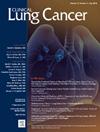A Phase II Study of Neoadjuvant Opnurasib KRAS G12C Inhibitor in Patients With Surgically Resectable Non-Small Cell Lung Cancer (CCTG IND.242A): A Substudy of the IND.242 Platform Master Protocol
IF 3.3
3区 医学
Q2 ONCOLOGY
引用次数: 0
Abstract
Molecularly targeted agents are increasingly being studied in the treatment of early-stage non-small cell lung cancer (NSCLC) to try and improve cure. However, phase 3 data on neoadjuvant therapy have largely been conducted in a biomarker agnostic manner with inconsistent exclusion of EGFR and ALK alterations. Our objective was to develop IND.242 as a large-scale neoadjuvant platform trial to introduce novel agents into the preoperative window for molecularly-defined NSCLC patient populations. Given that KRAS G12C mutations are common in the overall NSCLC patient population, ranging from 9.4% to 13% of cases across different cohorts, and may be associated to worse prognosis, the initial IND.242A Substudy was designed to test neoadjuvant JDQ443 (opnurasib), a selective KRAS G12C inhibitor. This current trial report describes the multicenter, Canadian Cancer Trials Group (CCTG)-led IND.242 neoadjuvant phase 2 platform master protocol and its first Substudy (IND.242A) of neoadjuvant opnurasib KRAS G12C inhibitor for patients with surgically resectable NSCLC (AJCC 8th edition stage IA2 to IIIA). In IND.242A, a maximum of 27 patients will be accrued in participating Canadian sites. The primary objective is the rate of major pathological response (MPR) following neoadjuvant opnurasib. Secondary objectives include safety and tolerability of the treatment regimen, objective response rate (ORR) by RECIST 1.1 for the neoadjuvant treatment period, pathological complete response (pCR) rate, event-free survival (EFS) at 2 years, and surgical outcomes. Exploratory objectives are to explore patient related outcomes (PROs) and identify potential predictive biomarkers of response and mechanisms of resistance on tissue and peripheral blood samples.
手术切除的非小细胞肺癌患者新辅助奥普那拉西卜 KRAS G12C 抑制剂的 II 期研究(CCTG IND.242A):IND.242平台主协议的子研究。
分子靶向药物越来越多地被用于早期非小细胞肺癌(NSCLC)的治疗,以提高治愈率。然而,有关新辅助治疗的 3 期数据大多是以生物标记物不可知的方式进行的,排除表皮生长因子受体(EGFR)和 ALK 改变的情况并不一致。我们的目标是开发 IND.242 作为大规模新辅助平台试验,将新型药物引入分子定义的 NSCLC 患者群体的术前窗口期。鉴于KRAS G12C突变在整个NSCLC患者群体中很常见,在不同队列的病例中占9.4%到13%不等,而且可能与较差的预后有关,因此最初的IND.242A子研究旨在对选择性KRAS G12C抑制剂JDQ443(opnurasib)进行新辅助试验。本试验报告介绍了加拿大癌症试验小组(CCTG)领导的多中心IND.242新辅助治疗2期平台主方案及其针对可手术切除的NSCLC(AJCC第8版IA2期至IIIA期)患者的新辅助治疗opnurasib KRAS G12C抑制剂的首次附属研究(IND.242A)。在IND.242A中,加拿大参与研究的机构最多将招募27名患者。主要目标是新辅助奥普拉西布治疗后的主要病理反应率(MPR)。次要目标包括治疗方案的安全性和耐受性、新辅助治疗期间的RECIST 1.1客观反应率(ORR)、病理完全反应率(pCR)、2年无事件生存期(EFS)和手术效果。探索性目标是研究与患者相关的结果(PROs),并确定组织和外周血样本中潜在的反应和耐药机制预测生物标志物。
本文章由计算机程序翻译,如有差异,请以英文原文为准。
求助全文
约1分钟内获得全文
求助全文
来源期刊

Clinical lung cancer
医学-肿瘤学
CiteScore
7.00
自引率
2.80%
发文量
159
审稿时长
24 days
期刊介绍:
Clinical Lung Cancer is a peer-reviewed bimonthly journal that publishes original articles describing various aspects of clinical and translational research of lung cancer. Clinical Lung Cancer is devoted to articles on detection, diagnosis, prevention, and treatment of lung cancer. The main emphasis is on recent scientific developments in all areas related to lung cancer. Specific areas of interest include clinical research and mechanistic approaches; drug sensitivity and resistance; gene and antisense therapy; pathology, markers, and prognostic indicators; chemoprevention strategies; multimodality therapy; and integration of various approaches.
 求助内容:
求助内容: 应助结果提醒方式:
应助结果提醒方式:


